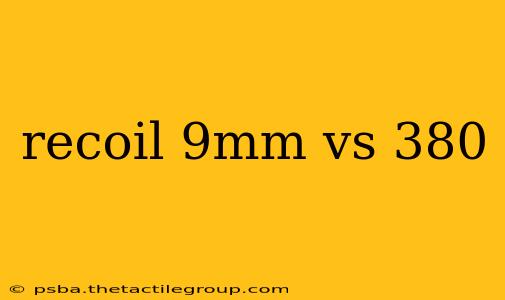Choosing between a 9mm and a .380 pistol often hinges on recoil management. Both calibers are popular for concealed carry, but their recoil characteristics differ significantly, impacting shooter comfort, accuracy, and overall suitability for various applications. This detailed comparison will explore the recoil differences, helping you make an informed decision.
Recoil: The Key Difference
The core difference between 9mm and .380 ACP lies in their cartridge size and power. The 9mm Parabellum (or 9x19mm) is a larger, more powerful round than the .380 ACP (9x17mm). This translates directly to noticeable differences in recoil.
9mm Recoil: The 9mm generally exhibits more recoil than the .380. While manageable for most shooters, the increased felt recoil can affect accuracy, especially during rapid fire or extended shooting sessions. The heavier recoil can also contribute to greater muzzle flip, requiring more conscious effort to maintain sight alignment.
** .380 Recoil:** The .380 ACP is known for its significantly lighter recoil. This makes it a popular choice for smaller-framed individuals, new shooters, or those seeking a less-intimidating firearm for self-defense. The reduced recoil facilitates faster follow-up shots and contributes to improved accuracy, particularly for those less experienced with handguns.
Factors Influencing Perceived Recoil
While cartridge size is the primary factor, several other elements influence the felt recoil:
-
Gun Weight: A heavier pistol will absorb more recoil energy, making it feel less significant. Lighter pistols, while easier to carry, will amplify felt recoil in both calibers.
-
Barrel Length: Longer barrels generally reduce felt recoil by allowing more complete propellant burn.
-
Grip Design: A well-designed grip that fits your hand properly improves control and reduces perceived recoil. Ergonomics play a crucial role in managing recoil effectively.
-
Ammunition: Even within the same caliber, ammunition variations (e.g., bullet weight, powder load) can slightly alter recoil characteristics.
Beyond Recoil: Other Considerations
While recoil is a critical factor, it shouldn't be the sole deciding element. Here's a broader perspective:
Stopping Power: The 9mm generally offers superior stopping power compared to the .380 ACP due to its greater energy and penetration capabilities. While .380 can be effective, the 9mm statistically offers a higher probability of incapacitating a threat.
Concealability: Both calibers are suitable for concealed carry, but the smaller .380 pistols often allow for easier concealment, especially for individuals with smaller body frames. However, advancements in 9mm pistol design have resulted in increasingly compact and lightweight options.
Accuracy: While .380's lighter recoil contributes to improved accuracy for some, proficient shooters can manage 9mm recoil effectively. Ultimately, accuracy depends more on training and practice than solely on caliber.
Conclusion: Making the Right Choice
The "best" caliber depends on individual needs and preferences.
Choose 9mm if:
- You prioritize stopping power and are comfortable managing moderate recoil.
- You have experience with handguns and can effectively manage recoil.
- You're comfortable with slightly larger and potentially heavier firearms.
Choose .380 ACP if:
- You prioritize minimal recoil and ease of handling.
- You are a new shooter or have limited experience with handguns.
- You require a very easily concealable firearm.
Ultimately, the best way to decide is to rent or borrow both calibers and test them at a shooting range. This hands-on experience will provide the most accurate assessment of which firearm feels best and meets your specific needs. Remember to always prioritize proper training and safe gun handling practices.

